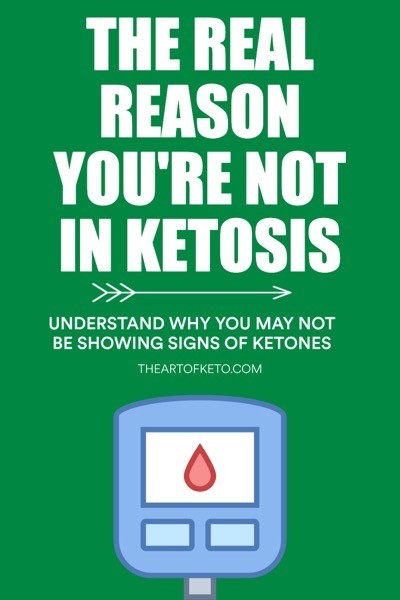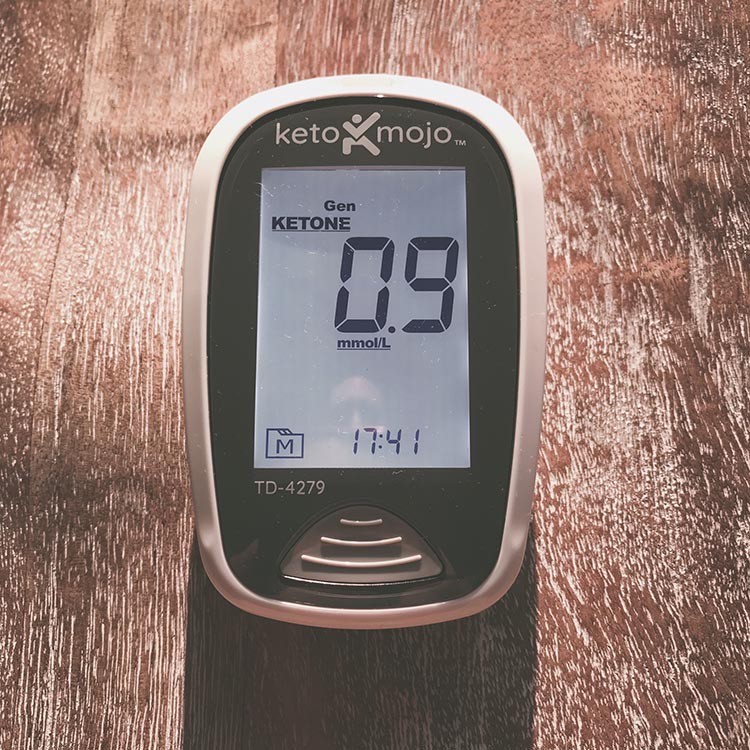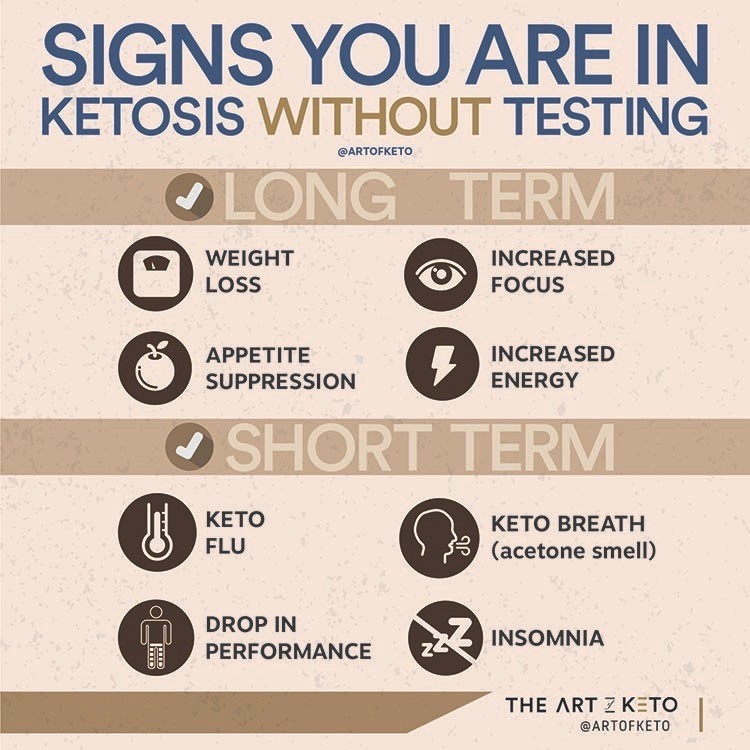Navigating a ketogenic diet can be hard at times, especially if you've just switched from a relatively high carb lifestyle. There are little nuances that may have you asking why you're not in ketosis, but the answers aren't always so clear.
Not achieving or maintaining ketosis is caused by three reasons. Overconsuming carbohydrates is the most common reason, followed by consuming hidden carbohydrates in different foods due to mislabeling. Finally, someone may be in ketosis, but the method used is giving a false reading.
In this article, I'll go over exactly why you're not in ketosis, or at least not showing any ketones. I'll also go over how you get in and maintain a state of ketosis, how long it usually takes, and how to accurately check if you're in ketosis or not.

Reasons You May Not Be In Ketosis
Reason #1 You're Consuming Too Many Carbohydrates
The first apparent reason why you may not be in ketosis is you're probably consuming too many carbohydrates.
How many carbohydrates are too many?
The amount of carbohydrates that will prevent or kick you out of ketosis is different for everyone. Generally, when it comes to how many carbohydrates someone can consume and still achieve a state of ketosis comes down to:
- Body size
- Muscle mass
- Activity levels
It's not uncommon for high-level athletes or very active individuals to be able to consume upwards of ~100 to 200 net carbs per day and still get into ketosis.

While you may see general recommendations of keeping your carbohydrates between 5 to 10 percent or between 20 to 50 grams of net carbs, these numbers don't take the individual into account.
Do you think a 200lb male who works out and has an active job versus a 120lb female who doesn't work out and sits at a desk all day will have the same requirements?
While being smaller doesn't automatically mean your carbohydrate tolerance is less, it may be what's keeping you from getting in or maintaining ketosis. Try reducing your net carbohydrates further or counting total carbohydrates and seeing if that does the trick.
Reason #2 You're consuming hidden carbohydrates
By hidden carbohydrates, you may be consuming food or foods that you believe to be safe generally, but may not be. If you're assuming a dish you ordered while eating out is safe, think again.
Most dishes at restaurants have flour mixed in, marinated in sugar, topped with a sugary sauce, or a combination of the above. You can never be too sure about the contents of a dish, especially if you didn't check with the staff before ordering.
Plenty of individuals suffer from many food allergies or have strict dietary needs. Restaurants are more than willing to let you know if a dish has a particular ingredient or not.
Servers and cooks are more than happy to let you know if you ask.Also, foods from the store that you may think are safe, but don't bother checking, can be laced with carbohydrates as well. First, if it has a nutrition label, do a double check to make sure it's keto-friendly and fits into your diet. Second, if it doesn't have a label, then you'll have to ask or try and find the nutritional information online.
Some foods that may sound keto-friendly, but may unexpectedly not be, include some beef jerky, sausages, deli meats, and anything else that can be mixed or marinated. If you find yourself not in ketosis and frequently eat these types of foods, invest a little time and find out.
Lastly, while not a hidden carbohydrate, sugar alcohols, and soluble fibers, like chicory root fiber (inulin), found in all the ketofied treats may be affecting you more than you think. While it's ok to have keto treats once in a while, don't make it a point to eat them often.
I like to have people I coach track their total carbohydrates, sugar alcohols, and everything. By counting every carb, it helps keep them accountable and mindful of the food choices they make. Coincidentally, they all seem not to have a problem getting in and maintaining a moderate level of ketones.
Again, sugar alcohols and fibers affect everyone differently. Some people may be able to tolerate high amounts of dietary fiber and sugar alcohols and have no problems achieving and maintaining ketosis.
You may be one of the unlucky ones that get knocked out of ketosis with large amounts of sugar alcohols and fibers, so count ALL carbohydrates, not just net carbs.Reason #3 Your method of testing is inaccurate
When individuals first get started on a keto diet, their primary method of testing if they're in ketosis or not is by using ketosis strips. More specifically, they use keto urine test strips as a means to check if they're in ketosis or not.
At first, using the keto strips is an excellent gauge to monitor progress. Ultimately, you may begin to see lower and lower levels of ketones each week. Eventually, you may see no trace of ketones in your urine, but why is that?
Assuming no changes to your diet and you've previously seen moderate or high levels of ketones in your urine, you're likely still in ketosis.
You may see lower levels or no levels of ketones via keto strips because, after a couple of weeks, your body becomes more efficient at using ketones. The ketones that once showed up on your keto strips were a result of “wasting ketones.”
When you first switched to a keto diet, your body did not have the necessary transporters and enzymes to use ketones efficiently. Your body couldn't use ketones in an efficient matter; a lot of them were excreted via your urine, but also your breath.
The excretion of ketones via your urine was an indication that you were producing ketones, but instead of being used, they were excreted, “wasted.”
The wasting of ketones may explain the reason why you may have also experienced a slightly sweet, almost nail polish smell to your breath, aka keto breath.
Once your body begins to create new transporters and up-regulate enzymes better equipped to process and use ketones, you naturally begin to show lower levels, and for some none at all.

5 Signs Of Ketosis Without Testing
While using a blood ketone meter is considered the gold standard when measuring levels of ketones, there are non-scientific signs and symptoms that you can look out for.
Mental clarity
There's a reason why ketogenic diets and supplementing with exogenous ketones are studied for their therapeutic use in neurodegenerative diseases1 :
- Parkinsons
- Alzheimer's
- Epilepsy (the original reason for the creation of the keto diet)
- Neuroprotective agents for developmental brain injuries2
The reason a keto diet and exogenous ketones are used with neurodegenerative diseases is the brain loves ketones. Aside from glucose (sugar), the only other fuel the brain can use is ketones.
Even when glucose is present, the brain will readily use ketones for fuel if available. While the brain will always need some amount of glucose, which the body can make during periods of severe carb restriction, the brain can derive up to 75% of its total energy requirement from ketones once keto-adapted.34
Per unit of oxygen used, ketones provide more energy, making it a more efficient fuel than glucose. Ketones can produce more energy than glucose with less oxygen.
Steady energy
A well-formulated ketogenic diet can lead to stable blood sugar and low insulin levels. The lower intake of carbohydrates helps to eliminate large spikes in blood sugar, reducing the dips that are typically associated with a glucose-based diet.
Symptoms of low blood sugar include:
- Trouble thinking or concentrating
- Dizziness
- Hunger
- Fatigue
- Sudden mood change
Basically, you start to get hangry.
On a ketogenic diet, you have a steady stream of fuel, either from fat you've ingested or fat from your body.
Increased water loss
Within the first week or two of a ketogenic diet, you'll likely experience an increase in water loss, which leads to a massive drop on the scale.
You may notice that when you first start a ketogenic diet, you experience more frequent trips to the bathroom. If you're wondering why you had to pee so much when starting keto, this is why.
As carbohydrates from the diet are limited, and stored carbohydrates burned, water is released. Every gram of carbohydrate holds ~3 grams of water, and your average adult stores ~500 grams of carbohydrates.
If you do the math, that's nearly 2,000 grams of weight that you can potentially lose in the first week from stored carbohydrates and water, that's not even counting any fat loss.
Keto breath
Keto breath is quite common for many people who start a ketogenic diet. Keto breath can be described as a fruity, nail polish remover-type smell.
This smell, which smells like nail polish remover, is not without reason.
At the beginning of a ketogenic diet, the body is inefficient at utilizing ketones for fuel. Due to inefficiency, ketones are excreted at larger rates, primarily through your urine and breath.
One of the ketone bodies your body creates is acetone, basically the main ingredient in most nail polish removers, which would explain the similarity.
Reduced hunger
One of the most significant benefits of a ketogenic diet is appetite suppression. Appetite suppression is one of the primary mechanisms by which a ketogenic is effective for weight loss and management.
In studies where low carb ketogenic dieters were allowed to eat ad libitum, they naturally ate less than those who were on carbohydrate-based diets. The low carb ketogenic group naturally ate less, despite weight loss not being the goal of the study.5
A common pitfall to most diets with the goal of weight loss is hunger. If you're able to reduce your hunger or suppress your appetite altogether, you're more likely to stick to your diet.

How Long Does It Take To Get Into Ketosis
How long it takes to get into ketosis will vary from person to person, but most people will start to see ketones within 24 to 72 hours. If you want to know how to get into ketosis in 24 hours or less, then the quickest way would be to fast.
You can speed up the transition into ketosis even further by including some cardiovascular exercise, but you may not be as motivated to do so while simultaneously fasting. Besides, whether it takes a day or three, will it matter in the big scheme of things?
Probably not.
You may be wondering how about intermittent fasting.
Will intermittent fasting get you into ketosis quicker? And the answer is, of course, just like fasting would get you into ketosis faster because you're not eating, the same applies to intermittent fasting because you're not eating for some time.
At the end of the day, it's not going to make much of a difference whether you get into ketosis in 24 hours or 72 hours. Utilize the methods that will allow you to stick to your ketogenic diet without making yourself suffer or impede on your life.
The Takeaway
Why you do not measure sufficient levels of ketones is usually a result of eating too many carbohydrates, whether knowingly or hidden in foods you regularly eat.
Additionally, if your primary method for testing for ketones is urine strips, you can show false negatives after you become keto-adapted. You may merely be burning all the ketones your body is producing, leaving little to none to be excreted. A better method for measuring levels of blood ketones is by using a blood ketone meter.
Whether you're in ketosis or not, losing weight will boil down to eating fewer calories than you burn.
Chase results, not ketones.
